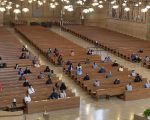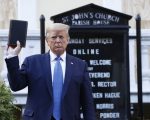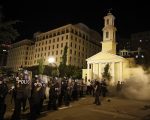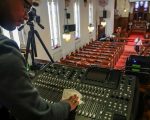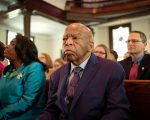Evangelical, Midwestern, Southern Churches Most Likely to be Meeting in Person Again
Which churches have resumed gathering in person amid the coronavirus pandemic? Mostly evangelical Protestant churches rather than mainline Protestant and, more often, those that are located in the South or Midwest, according to a new survey released Friday (July 24) by LifeWay Research.
Fewer Americans Reading the Bible During Coronavirus Pandemic
People may be reading the news and “doomscrolling” through social media during the coronavirus pandemic. But what they don’t appear to be reading is the Bible.
As Depression, Anxiety, Grief Spike During Pandemic and Protest, Churches Offer Hope, Mental Health Resources
As Americans deal with the impacts of the pandemic and the country’s reckoning over racism, many Christian leaders, organizations and churches are providing resources not only to care for their spiritual and physical health, but also their mental health.
New Ad Uses Bible, ‘Amazing Grace,’ Jesus to Call Republican Christians to Vote Against Trump
A new political advertisement calls on Republican Christian voters to turn against Donald Trump this November, arguing the president’s rhetoric and actions are out of step with their faith.
Churches Amid the Pandemic: Some Outbreaks, Many Challenges
Crowded bars and house parties have been identified as culprits in spreading the coronavirus. Meat packing plants, prisons and nursing homes are known hot spots. Then there’s the complicated case of America’s churches.
Washington’s ‘Church of Presidents’ Etched in History Again
Core principles such as support for equal rights, community engagement and eschewing partisan politics while not shying away from the pressing issues of the moment have guided St. John's for decades and continue to do so today, after the church once again found itself at the center of an American awakening over racial injustice following George Floyd's killing.
Death of Megachurch Pastor Darrin Patrick Officially Ruled a Suicide
Megachurch pastor Darrin Patrick’s cause of death has officially been ruled a suicide, according to the Franklin County Sheriff’s Department.
Black Churches Have Lagged in Moving Online During COVID – Reaching Across Generations Could Help
From online campaigns for justice to popular TikTok challenges, Black young adults are at the forefront of social media trends. But when it comes to the Black Church, the same cannot be said — it has lagged behind in the rush to go digital.
‘Good Trouble’ Documentary Follows John Lewis from Fields of Alabama to Halls of Congress
A new documentary, which is to be released on demand and in select theaters on Friday (July 3), traces the journey of U.S. Rep. John Lewis, a Baptist, from the fields of Alabama to the halls of Congress. The film portrays how Lewis was shaped by his faith and guided by religious leaders such as Martin Luther King Jr. and James Lawson, two advocates for nonviolent civil rights action.
Evangelical Leaders are Speaking about Race — But Will Focus Last?
Many prominent white evangelicals have made statements about Black lives in the weeks since the death of George Floyd, but is this new focus among white conservatives — and white Christians in general — momentary or lasting? Highlights of a forthcoming study, which looks at racism, biblical interpretation, and church cultures, may indicate a long struggle ahead.

